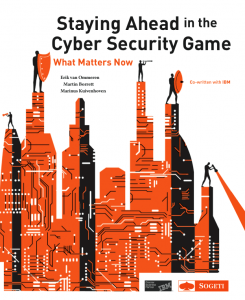NEW BOOK: STAYING AHEAD IN THE CYBER SECURITY GAME!
June 12, 2014
 Today, Sogeti and IBM launch their latest book: Staying ahead in the Cyber Security Game. In the book, the authors describe the present day state of security: the threats, the changes and the challenges companies are facing. The book, which was written by Sogeti in collaboration with IBM, and will be available today. You can order a copy, or download a digital pdf from the Sogeti bookstore (or perhaps ask your Sogeti contact person for a hardcover copy?)
Today, Sogeti and IBM launch their latest book: Staying ahead in the Cyber Security Game. In the book, the authors describe the present day state of security: the threats, the changes and the challenges companies are facing. The book, which was written by Sogeti in collaboration with IBM, and will be available today. You can order a copy, or download a digital pdf from the Sogeti bookstore (or perhaps ask your Sogeti contact person for a hardcover copy?)
Cyber Security is ‘hot’. Not a day goes by or new threats have been discovered, and new defenses have been introduced. A recent report estimated the total global damage inflicted by cyber crime to be close to 500 billion dollars, and that’s not even counting the effects of ‘cyber-warfare’. What should you do? What can you do as a person, and what should companies do?
The book highlights the big changes that are happening in cyber security: from the mobile revolution and BYOD hype to increased acceptance of the fact that ‘you will be hacked’. And that it’s ok to accept that you will be hacked, just like any bank knows that they will face fraud, or any store knows they will face theft. It’s how you minimize the impact and organize the response that counts, at least as much as prevention, defense and deterrence. This of course has consequences for how you organize and execute your security, your strategy etc.
These topics, and more, can be found in this 80 page book, that is written in such a way that it’s interesting for both the security experts as well as any manager who is in some way touched by information technology, security or organizational risk management…. which covers probably everybody these days?

 English | EN
English | EN 